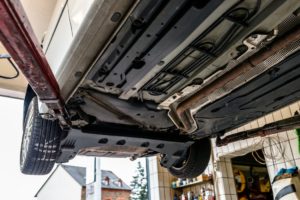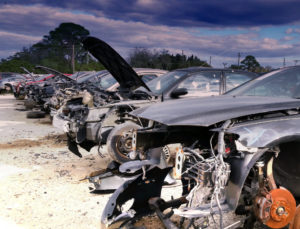Chances are if you own a car, you understand that your car carries a title. A car’s title is issued by the Department of Motor Vehicles (DMV) and includes: the owner’s name, year, make and model of the car, and the cars’ history.
Did you know there are 4 different types of car titles?
A clean title is the ideal title, it documents that the car has not received any major damage from the current or previous owners.
A clear title refers to the financial status of the car. It means the car has no lien on it and the current owner owns it free and clear.
A salvage title is attached to a car that has received major damage and is considered a total financial loss.
A rebuild/reconstructed title is a salvaged title car that has been repaired and inspected by the state. This does not mean the car will not have problems in the future, just that it is in safe working order when inspected.
If you are considering buying a salvage title car, read on to learn the pros and cons so you can determine the right course of action for you.
How A Car get Classified a Salvage Title?
There are several ways for a car to get classified as a salvage.
1. It Sustained Significant Damage from an Automobile Accident
This means that the cost to repair the car (including parts and labor) is above 75% of the car’s Kelly Blue Book value.
2. It Sustained Damage Due to A Natural Disaster (Fire, Flood, or Hurricane)
As the climate changes, we are seeing increases in weather extreme. While we commonly think of damage to lives and homes after a natural disaster many cars are equally damaged or destroyed.
3. It Had a Great Life but Is Beyond Reasonable Repair
The car that has served you or your family for years has too many miles, rust, or issues that repaying it just does not make financial sense.
4. It Wast Stolen and Recovered
Some states even classify stolen cars as salvaged after they are recovered. If for example your car has been stripped of parts and found without a hood or tires. Chances are it will be classified as a salvaged car.
Even if the car looks like it is in good working order, there may be no way to tell if your car was damaged while in the thieves’ possession. So some states will issue a salvage title.
Other Issues Surrounding Salvaged Titled Cars
Every state has its different definition of salvage so be sure to understand the laws that govern you.
Keep in mind if the car is labeled as a salvage, for any reason, the state considers it legally undrivable, therefore it is unable to be registered or insured. This can change after the car is repaired and re-evaluated by the state.
With a salvaged title the value of the car decreases significantly, in some cases up to 40% less than one with a clean or clear title after it has been repaired.
Pros of Buying a Salvage Title Car
We all love a deal, and chances are if you are considering purchasing a salvage title car, the first thing you will see is the low price. This can be beneficial for individuals who know what they want and can accurately determine the damage to the vehicle. If you have some mechanical ability it is a great way to get an inexpensive car and return it to running through a little hard work.
In some cases, the salvaged car is not that significantly damaged. If a car was damaged in an accident and the owner really doesn’t want to keep the car. The insurance company may decide to salvage it instead of paying out a significant amount in repairs.
If a car is listed as salvage and you understand the damage, the insurance company will also want to unload it quickly. The buyer, in this case, can push their savings a little further by agreeing to a quick sale.
Cons of Buying a Salvage Title Car
Be sure to remove your rose-colored glasses when it comes to a salvaged car there are some pretty sizable risks along with the potential benefits. Weight the pros and cons carefully before making a decision.
While some salvaged cars have relatively minimal damage others are just the opposite. Examples include damage to the structure of the frame or engine block.
Once a salvaged title, always a salvaged title. While you can repair the car and make it legal to dive, register, and insure, the history of the car will follow it. This makes re-selling your car harder.
If your goal is to drive it until it will be turned into scrap then you will want to look at the cost of the needed repairs, how long the repaired car may serve you, and how much you may make when you sell it for scrap. Determine if this “deal” is really a deal in the long run.
You will need to function on a cash basis, most banks and auto lenders are not willing to finance a car with a salvage title.
It will be a similar situation when you go to insure the car. After the salvaged carr is repired you will still have a hard time obtaining 100% insurance coverage.
Consider These Important Caveats as Well
Salvaged cars that are repaired are not like fixer upper homes. You will need to disclose that the car was once had a salvage title. Failing to do so is illegal.
On top of that, a flipped house is considered a good thing and ups the value, a “flipped” car is not and its value will never increase to the level of the same car with a clean, clear title.
Ultimately, you will have to determine if the time, money, effort, and restrictions balance out the cost-saving when it comes to buying a salvage title car. In the end, do your research so you go into your decision with all the information.
Do You Want to Turn Your Car into Cash?
There are pros an cons to buying a salvage title car. If you are looking to sell a salvaged car click here for how our buying process works. We happily provide quick quotes to help you turn your unwanted car into cash.
We have offices nationwide and our team can answer all of your questions to ensure you have a positive selling experience.


